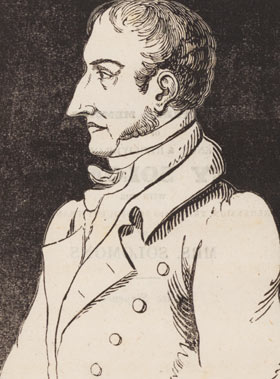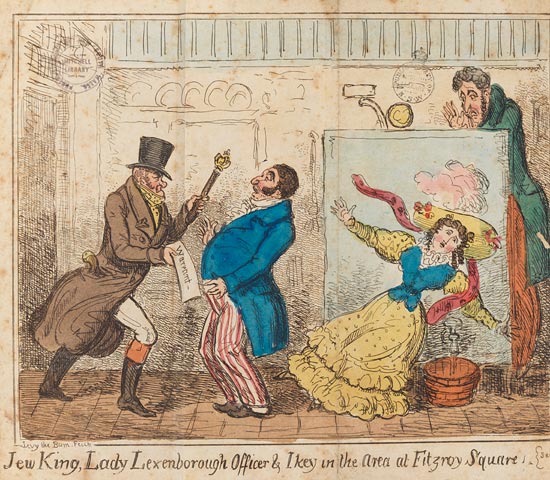Ikey Solomon

Portrait of Ikey Solomon, in Adventures, memoirs, former trial, transportation & escapes of that notorious fence and receiver of stolen goods, Isaac Solomons, better known to the public by the cognomen of Ikey Solomons, by a former police officer, 1829. Printed. DSM/A923.41/S
More than any other convict of Jewish origins, Isaac 'Ikey' Solomon (also known as Solomons) remains prominent in the public imagination. Ikey Solomon is believed to have been the inspiration for the notorious character Fagin in Charles Dickens’s Oliver Twist. Ikey and his family were also the subjects of novelist Bryce Courteney's 'Australian trilogy', comprising The Potato Factory, Tommo and Hawk and Solomon's Song.
Ikey was born in about 1785 at Houndsditch in London’s East End. His father, Henry, was well known as a fence, or receiver of stolen goods, and it's possible that Henry introduced his son to this occupation. Ikey married Ann (or Hannah) Julian in 1807, and his first documented clash with the law was his appearance at the Central Criminal Court – the Old Bailey – in 1810. He was sentenced to transportation for pick-pocketing and confined to the Zealand prison hulk, but not sent to Australia. Escaping the hulk, Ikey later turned himself in and received a pardon in 1816.
By the 1820s Ikey Solomon was operating a flourishing pawnbroking business. Unfortunately, many of the goods Ikey sold were actually stolen property. Indeed, it's quite possible that he orchestrated burglaries in order to acquire much of the jewellery and other valuables he later sold. In 1827 Solomon was arrested but escaped from custody. Handsome and neatly dressed, Ikey was well known to the police and to the judges of London. Unable to locate him, however, the police found stolen goods in the Solomon family home. This led to his wife Ann's conviction and transportation, along with their children, to Van Diemen’s Land on the Mermaid in 1828.
Meanwhile, Ikey had crossed the Atlantic where he had further encounters with the law in New York. He was in Brazil when he heard of Ann’s transportation and, travelling as 'Mr Slowman', he sailed from Rio de Janeiro to Hobart, hoping to be reunited with his family.
Ikey’s arrival in Hobart created a sensation. He was immediately recognisable and many convicts felt they would never have been transported had they not encountered Ikey in the first place! Yet, having committed no crime on Vandemonian soil, he could not be arrested by the colonial authorities. The British government sent a warrant which was challenged by Ikey and his legal counsel. Then Governor George Arthur issued a warrant under his own name, and this was enough to have Ikey returned to England for trial.
Charged on eight counts of receiving stolen goods, after many sittings in the Old Bailey Ikey was finally convicted on two charges, and sentenced to 14 years’ transportation. The William Glen Anderson brought Ikey back to Van Diemen’s Land, and tantalisingly close to the homes of his family. He was sent first to Richmond and then to Port Arthur, where he worked as a police constable or 'javelin man'.
Ikey was granted a ticket of leave in 1835, provided that he resided more than 20 miles out of Hobart, and had hopes of living with his family once again. But his dreams of domestic bliss were never realised. During Ikey’s long absence his wife had established a relationship with another man, and there were many violent clashes between Ikey, Ann and their children. He eventually set up a tobacconist's shop in Hobart and was a seatholder at the Hobart Synagogue. Ikey died on 3 September 1850 and was buried in Hobart's Jewish cemetery.

The arrest of Ikey Solomon, engraving, attributed to George Cruikshank. Published in Moses Hebron, The life and exploits of Ikey Solomons, 1829. Printed. A923.41/S
> Read the historic pamphlets published at the time of Ikey Solomon's arrest


